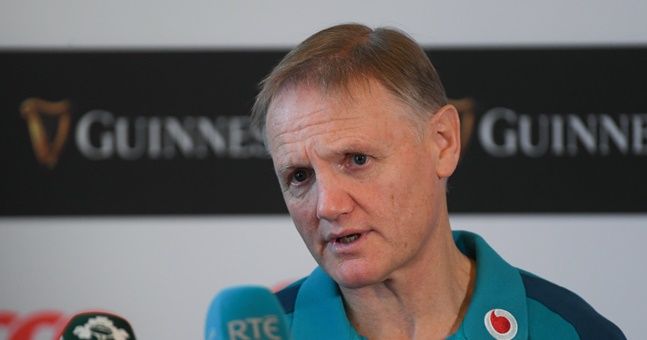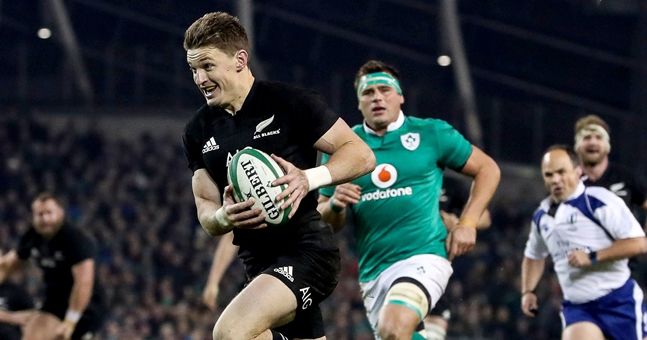

Share
17th November 2018
05:04pm GMT

"Joe was a stickler for detail and he was something very, very different for a provincial junior club back in 1991," Willy Macken, a former teammate of Schmidt's told SportsJOE. "When Joe first arrived he described his journey down the M4 as horrific. You have to remember there were no motorways back then and his first introduction to the town was at Con's Bar. "Back then it would have been smoke filled and Joe's eyebrows were already raised. He would have been a stickler but when he came out to the club training we wouldn't have had that many balls.Schmidt's attention to detail is one of the hallmarks of his coaching career but it's a trait that extends far beyond the rugby pitch. Former Leinster and Connacht lock Ben Marshall noted last year that Schmidt remembers everyone, from your parents, to your partner to your siblings, and it was a trait that was very much present even at that stage of his life."We'd four teams and about four or five balls. Joe arrived out a week later with about 50 or 60 balls. Just a phenomenal amount of balls. He was only about 25 at the time but those simple things had a huge impact on the club and the players there. "All of a sudden we were going from maybe a ball between forwards and one out in the backline but Joe wanted everyone running with the ball. He brought that to the club almost immediately."
"If you met Joe, you'll probably know this yourself, but he never forgets a name," added Macken. "I've never met, and I'm not saying this just because it's Joe Schmidt, but there's very few people that have that sort of recall. We would have had a lot of players back in those days, and whether you were a firsts player or a fourths player, Joe knew who you were. For a young fella it was astonishing. "I think that's what endeared him to the club so soon. He knew your wife, your girlfriend, no one was excluded. We opened the club's 4G pitch back in 2014 and he was going around talking to everyone. I was on his shoulder and I was just like 'how on earth does he do this?' "'How's Eileen' he said to a guy that I couldn't even recall his name."Schmidt wanted to move to Ireland to coach but his ability as a player, and the level he played at with Manawatu in New Zealand, immediately gave him a level of credibility among the club's players.

"We saw Joe first as a player. We had a coach, a fella called Len Ethell, and of course Joe was going to help out with Lenny. "Lenny wouldn't have been a player of Joe's ability because Joe would have been playing for Manawatu when he came to us, which was still a level way above, so the respect we would have shown him would have been huge. No one was going to turn around and go 'who the hell is this guy?' "That wouldn't have occurred anyway. There was never a raised eyebrow. It was skilled coaching. It was player coaching. You couldn't do anything without a ball. "Even the simplest things. I'd kick to touch for the team and I'd have to spend hours going up and down kicking a ball at training. There'd be scrum-halves who were shown new techniques. He came from New Zealand with huge knowledge but he would have spent a lot of time after games and training sessions with the forwards because he would have recognised that they had to learn how to cope with 15-man rugby. "He was using terminology we had never heard before. He brought different lingo in but it was great fun. He wasn't captain of the team but he was always very respectful of our captain Mick and he never enforced anything over people. I think he can work with anybody. He's that sort of guy."Mullingar was somewhat of a haven for prodigious New Zealanders looking to find their way in rugby with All Blacks fly-half Beauden Barrett also spending some time at the club as a youth.
 Barrett played Gaelic football with both St. Brigid’s GAA club and St. Fiach’s National School in the town of Ballinacree, Meath, but played some rugby with Mullingar where his talents were clear from a very early age.
Barrett played Gaelic football with both St. Brigid’s GAA club and St. Fiach’s National School in the town of Ballinacree, Meath, but played some rugby with Mullingar where his talents were clear from a very early age.
"The stories were quite simple with Beauden, he played GAA up the road from us and he played rugby with us on Saturday," added Macken. "I would have been helping out with the youths, not his team, but the child was most definitely talented. He was under 10 and along with one or two others on the team, they were very talented. "You can't pinpoint kids at that age but there was a game where he scored a phenomenal amount of tries at one of the blitzes in Athlone. "I wasn't there to see it but the story came back that this guy is after running rings around the opposition. He played a few more blitzes but he definitely had a flair."Closing in on a third consecutive World Player of the Year award, it certainly isn't a trait that has deserted him with age.
Explore more on these topics: